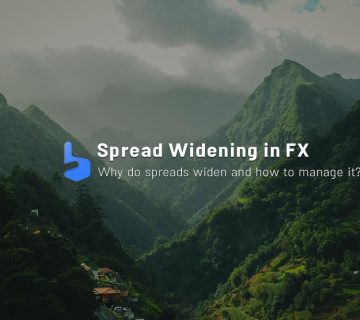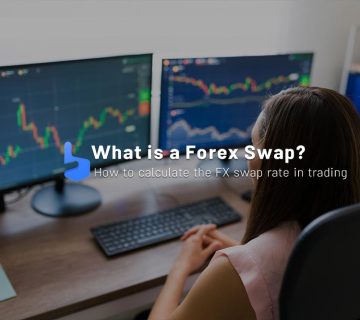What you are about to read:
Any market you can trade with us has a spread, which is the primary cost of a trade. In fact, there’s always a difference between the buying and selling price of a currency pair, and that’s precisely what this term means.
This difference in rates can sometimes be fixed and sometimes variable and floating, and it’s clear that the fixed type is more popular among traders because it offers more predictability. To understand the meaning of this topic, including what forex spread is, what types it comes in, and how it’s calculated, stay with Brokerland in this article.
What is The Forex Spread?
The forex spread is a small cost embedded in the bid and ask prices of each currency pair transaction. When you look at a price quoted for a currency pair, you’ll see a difference between the buying and selling prices – this is it.
Changes in this price difference are measured in pips with small price movements – each change in the fourth decimal place of a currency pair (or the second decimal place when trading currency pairs involving the Japanese yen) is a pip. It’s not just this that determines the total cost of your trade; the forex lot size is also a determining factor.
Remember, every forex trade involves buying one currency pair and selling another. The left-side currency is the base currency, and the right-side currency is the quote currency (for better understanding, refer to the currency pairs page on the Brokerland website). When trading FX, the bid price is the cost to buy the base currency, while the ask price is the cost to sell it.
How to Calculate Spread in Forex
To calculate this value in forex, you need to find the difference between the buying and selling prices in pips. You do this by subtracting the bid price from the ask price. For example, if you’re trading GBP/USD at 1.3089/1.3091, the spread is calculated as 1.3091 – 1.3089, which equals 0.0002 (2 pips).
Forex spreads can be either wide or narrow – the more pips you get from the above calculation, the higher this value is. Traders often prefer narrower values because it means more cost-effective trading.
If a market is highly volatile and lacks liquidity, the rate difference between buying and selling is likely to be higher, and vice versa. For example, major currency pairs like EUR/USD will have narrower ones compared to pairs in emerging markets like USD/ZAR. However, depending on the factors explained below, these values can change.
Types of Forex Spreads
Forex brokers offer various types of trading accounts, and to find the best ones, you can visit the Best Forex Brokers page for a better understanding. Brokers always provide different types of accounts with various spreads, which is one of the criteria for traders when selecting a broker. For example, this amount at Alpari Broker may differ in various accounts compared to Amarkets. These rate differences are classified into two categories:
- Brokers with Fixed Spreads
- Brokers with Floating Spreads
Let’s delve deeper into the concept of these two types.
Fixed
The difference in a fixed forex spread is constant and does not change with the time frame or market fluctuations. However, when market liquidity is low or there is significant market volatility, there may be temporary changes in the rate.
In such cases, when the market returns to its normal conditions, this amount also returns to its normal value. It’s clear that trading with a fixed type is more comfortable and profitable for traders because it is more predictable and carries lower risk.
Increased competition in recent years has led brokers to constantly strive to offer new features to their users, and these innovations are related to the spread difference. This has led to an increase in the number of brokers offering floating types of it.
Floating
In contrast to fixed forex spreads, floating types in forex are constantly variable. This means that the difference between the buying and selling rates is continuously changing. The difference in floating ones mainly reflects the interbank market and, to a large extent, represents interbank communications.
For this reason, some brokers offer trading accounts with floating spreads as ECN (Electronic Communication Network) accounts. In this platform, banks, market makers, and investors trade together in a system where they have lower forex spreads and, at the same time, pay their own commissions to the broker.
Why Does the Forex Spread Change?
As mentioned above, when the difference between the buying and selling prices of a currency pair changes, it is called a variable spread, unlike the fixed type. When trading in forex, you are always dealing with variable ones.
If there is significant news or an event that leads to increased market volatility, it is possible for this amount, or the difference between the buying and selling prices of a currency pair in forex, to widen. One of the drawbacks of the variable type is that if this is significantly widens, your positions may be closed, or you may face a margin call.
Summary
In this article, we discussed another basic term in the forex market that you need to know as you begin to learn forex. In summary:
- A forex spread is the initial cost of a currency trade embedded in the buying and selling prices of a currency pair.
- This value is measured in pips, which is a movement in the fourth decimal place in the forex pair (or the second decimal place in the case of JPY currency pairs).
- To calculate it, subtract the bid price from the ask price.
- They can be wide or narrow.
- Traders often prefer narrower ones because it means more cost-effective trading.
- If a market is highly volatile and lacks liquidity, this amount may widen.
- If a market has high liquidity but is not very volatile, it may be narrower.
- Factors such as significant news announcements or events that increase market volatility can lead to changes in the forex spread.











